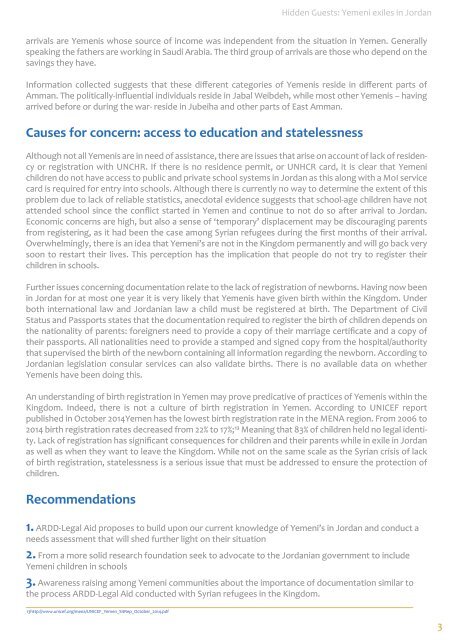Hidden Guests Yemeni Exiles in Jordan
hidden_guests_yemeni_exiles_in_jordan
hidden_guests_yemeni_exiles_in_jordan
Create successful ePaper yourself
Turn your PDF publications into a flip-book with our unique Google optimized e-Paper software.
<strong>Hidden</strong> <strong>Guests</strong>: <strong>Yemeni</strong> exiles <strong>in</strong> <strong>Jordan</strong><br />
arrivals are <strong>Yemeni</strong>s whose source of <strong>in</strong>come was <strong>in</strong>dependent from the situation <strong>in</strong> Yemen. Generally<br />
speak<strong>in</strong>g the fathers are work<strong>in</strong>g <strong>in</strong> Saudi Arabia. The third group of arrivals are those who depend on the<br />
sav<strong>in</strong>gs they have.<br />
Information collected suggests that these different categories of <strong>Yemeni</strong>s reside <strong>in</strong> different parts of<br />
Amman. The politically-<strong>in</strong>fluential <strong>in</strong>dividuals reside <strong>in</strong> Jabal Weibdeh, while most other <strong>Yemeni</strong>s – hav<strong>in</strong>g<br />
arrived before or dur<strong>in</strong>g the war- reside <strong>in</strong> Jubeiha and other parts of East Amman.<br />
Causes for concern: access to education and statelessness<br />
Although not all <strong>Yemeni</strong>s are <strong>in</strong> need of assistance, there are issues that arise on account of lack of residency<br />
or registration with UNCHR. If there is no residence permit, or UNHCR card, it is clear that <strong>Yemeni</strong><br />
children do not have access to public and private school systems <strong>in</strong> <strong>Jordan</strong> as this along with a MoI service<br />
card is required for entry <strong>in</strong>to schools. Although there is currently no way to determ<strong>in</strong>e the extent of this<br />
problem due to lack of reliable statistics, anecdotal evidence suggests that school-age children have not<br />
attended school s<strong>in</strong>ce the conflict started <strong>in</strong> Yemen and cont<strong>in</strong>ue to not do so after arrival to <strong>Jordan</strong>.<br />
Economic concerns are high, but also a sense of ‘temporary’ displacement may be discourag<strong>in</strong>g parents<br />
from register<strong>in</strong>g, as it had been the case among Syrian refugees dur<strong>in</strong>g the first months of their arrival.<br />
Overwhelm<strong>in</strong>gly, there is an idea that <strong>Yemeni</strong>’s are not <strong>in</strong> the K<strong>in</strong>gdom permanently and will go back very<br />
soon to restart their lives. This perception has the implication that people do not try to register their<br />
children <strong>in</strong> schools.<br />
Further issues concern<strong>in</strong>g documentation relate to the lack of registration of newborns. Hav<strong>in</strong>g now been<br />
<strong>in</strong> <strong>Jordan</strong> for at most one year it is very likely that <strong>Yemeni</strong>s have given birth with<strong>in</strong> the K<strong>in</strong>gdom. Under<br />
both <strong>in</strong>ternational law and <strong>Jordan</strong>ian law a child must be registered at birth. The Department of Civil<br />
Status and Passports states that the documentation required to register the birth of children depends on<br />
the nationality of parents: foreigners need to provide a copy of their marriage certificate and a copy of<br />
their passports. All nationalities need to provide a stamped and signed copy from the hospital/authority<br />
that supervised the birth of the newborn conta<strong>in</strong><strong>in</strong>g all <strong>in</strong>formation regard<strong>in</strong>g the newborn. Accord<strong>in</strong>g to<br />
<strong>Jordan</strong>ian legislation consular services can also validate births. There is no available data on whether<br />
<strong>Yemeni</strong>s have been do<strong>in</strong>g this.<br />
An understand<strong>in</strong>g of birth registration <strong>in</strong> Yemen may prove predicative of practices of <strong>Yemeni</strong>s with<strong>in</strong> the<br />
K<strong>in</strong>gdom. Indeed, there is not a culture of birth registration <strong>in</strong> Yemen. Accord<strong>in</strong>g to UNICEF report<br />
published <strong>in</strong> October 2014Yemen has the lowest birth registration rate <strong>in</strong> the MENA region. From 2006 to<br />
2014 birth registration rates decreased from 22% to 17%;¹³ Mean<strong>in</strong>g that 83% of children held no legal identity.<br />
Lack of registration has significant consequences for children and their parents while <strong>in</strong> exile <strong>in</strong> <strong>Jordan</strong><br />
as well as when they want to leave the K<strong>in</strong>gdom. While not on the same scale as the Syrian crisis of lack<br />
of birth registration, statelessness is a serious issue that must be addressed to ensure the protection of<br />
children.<br />
Recommendations<br />
1. ARDD-Legal Aid proposes to build upon our current knowledge of <strong>Yemeni</strong>’s <strong>in</strong> <strong>Jordan</strong> and conduct a<br />
needs assessment that will shed further light on their situation<br />
2. From a more solid research foundation seek to advocate to the <strong>Jordan</strong>ian government to <strong>in</strong>clude<br />
<strong>Yemeni</strong> children <strong>in</strong> schools<br />
3. Awareness rais<strong>in</strong>g among <strong>Yemeni</strong> communities about the importance of documentation similar to<br />
the process ARDD-Legal Aid conducted with Syrian refugees <strong>in</strong> the K<strong>in</strong>gdom.<br />
13http://www.unicef.org/mena/UNICEF_Yemen_SitRep_October_2014.pdf<br />
3


